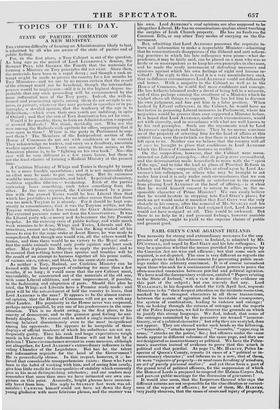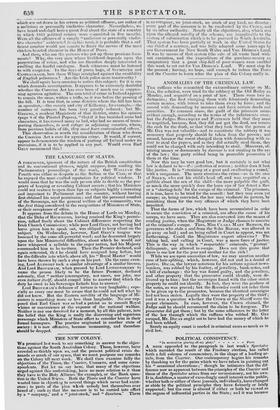EARL GREYS CASE AGAINST IRELAND.
THE necessity for strong and extraordinary measures for the sup pression of agrarian disturbances in Ireland, is admitted by Mr. O'CONNELL, and urged by Earl GREY and his late colleagues. It may be a question whether the means provided for this purpose by the Coercion Act are wise and efficient ; but that some such are required, is not disputed. The case is very different as regards the powers given to the Irish Government for preventing public meet- ings under this arbitrary enactment. It is of course incumbent upon those who seek for a continuance of these powers to prove the often-asserted connexion between prmdial and political agitation. We have read the documentary evidence, entitled " Papers relating to the State of Ireland," with a view to discover the evidence on this part of the subject; but can scarcely find any. Lord WELLESLEY, in his despatch dated the 15th April last, requests Ministers to fix "their deepest attention on the intimate connexion, marked by the strongest characters in all these transactions, between the system of agitation and its inevitable consequence, the system of combination, leading to violence and outrage:" but, on looking through the returns of outrages and the reports of the Police Inspectors, we fail to discover the grounds on which to justify this strong language. We find, indeed, that sonic of the outrages committed by the peasantry are termed "insurrec- tionary, or of a political character ;" but why they are so styled, does not appear. They are classed tinder such heads as the following, —"homicides," "attacks upon houses," "assaults," "apposing in arms," "attacks on the police," &c.; but offences under the same heads appear in different columns of the same page, and they are not designated as insurrectionary or political. We have the Police- man's assertion instead of evidence to prove that this attack is political and that medial. At page 75, Mr. HARVEY, Police In- spector of Queen's County, reports 34 cases of a" political or in- surrectionary character ;" and informs us in a note, that of these, 16 were "injuries of property—in most cases breaking of windows, an act qf purely personal malice;" and yet these form a part of the grand total of political offences, for the suppression of which the House of Lords is prepared to suspend the habeas Corpus Act, and prevent public meetings for the discussion of grievances!
It would also seem, that the Inspecturs.General who sign the different returns are not responsible for the classification or correct- ness of the reports of °agates ; for one of them, Mr. HARVEY. very justly observes, that the cases of arson and injury of property, which are set down in his return as political offences, are rather of a malicious or personally vindictive character. Nevertheless, we have heard and shall hear a great deal about the state of a country in which 1953 political crimes were committed in five months. Were all the offences of a simply "malicious or personally vindic- tive character" subtracted from this total, it is probable that a suf- ficient number would not remain to flurry the nerves of the most chicken-hearted alarmist in the House of Peers.
And then, who are the persons who get up these precious docu- ments? Why, the very men whose livelihood depends upon the perpetration of crime, and who are therefore deeply interested in swelling the fearful catalogue. Such witnesses must be listened to with suspicion. In the days of green bags, of SIDMOUTH and CASTLEREAGH, hew these Whigs inveighed against the credibility of English policemen ! Are the Irish police more trustworthy ? We shall again have occasion to notice this subject; for it is one which demands investigation. It appears to be extremely doubtful whether the Coercion Act has ever been of much use in suppres- sing agrarian agitation. The sum total of crime in Ireland appears to remain the same, within a trifle, as it was before the passing of the bill. It is true that, in some districts where the bill has been in operation,—the county and city of Kilkenny, for example,—the number of outrages has been very greatly reduced ; but Mr. GREENE, a resident Magistrate of that district, states his opinion (page 9 of the Printed Papers), "that if it has banished some bad characters, it has caused many as bad, who had no means of trans- porting themselves, to seek refuge in adjoining counties, where, from previous habits of life, they must have contaminated others.- This observation is worth the consideration of those who deem the Coercion Act a cure for agrarian crime. It would, if correct, appear to demonstrate the wisdom of putting all Ireland under its provisions, if it is to he applied in any part. Would even Earl GREY recommend this ?





















 Previous page
Previous page